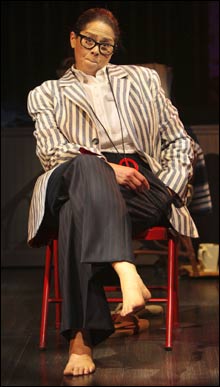Interview: Anna Deavere Smith contains multitudes
By IRIS FANGER | September 2, 2008

Anna Deavere Smith appears in Let Me Down Easy at the Loeb Drama Center September 12–October 11 |
Anna Deavere Smith is a writer/actor/activist who listens. She builds her award-winning one-woman, multi-character shows by conducting hundreds of interviews, then melding them into one devastating kaleidoscope of the causes and effects of a particular cultural trend or event. (Said events have included the race riots in Crown Heights and Los Angeles.) She seems to inhale the diverse personalities of her interviewees whole, their words, their gestures, their postures, their gut feelings, exhaling them in a collage that is revelatory as both social commentary and human portraiture.After teaching for a decade at Stanford University, Smith left California in 2000 for a dual appointment at New York University’s Tisch School of the Arts and its law school. The accolades for Fires in the Mirror, Twilight: Los Angeles, 1992, and House Arrest have included a MacArthur Fellowship, two Tony nominations, two Obie Awards, 17 honorary degrees, and being shortlisted for the Pulitzer Prize. But she’s probably best known for her role as Michael Douglas’s press secretary in Rob Reiner’s The American President and her subsequent television turn on NBC’s American President–influenced The West Wing. Next year she’ll be seen in Jonathan Demme’s Rachel Getting Married. Here’s what she had to say about her latest one-woman show, Let Me Down Easy, which the American Repertory Theatre is hosting starting next Friday.
Tell us something about this project.
I did the show at Yale, but I’ve changed it. My work always changes until I shut it down, so this is part of the process. I’ve been on a journey; it started in 2000 at the Yale School of Medicine, where I was invited to look at doctor-patient relationships, and I was so fascinated about how the patients spoke to me. I guess when you’re uncomfortable, or have had a bad experience, you want to talk. Basically, for my work in theater, I’m looking for people who want to talk. Now it’s really dealing with mortality, and about how we are with other human beings. I see it as a search for grace in a sometimes distressing world, and in the face of our inevitable mortality. I went to Rwanda to do research 10 years after the genocide; I went to the north of Uganda and talked to child soldiers and sex slaves. I went to South Africa to do research on AIDS, at a time when the president of the country was not acknowledging the disease; I went to the army hospital where they bring the soldiers who have been injured in Iraq. And I went to Katrina and spent time at a cancer center in Houston. It’s been a very long journey. What you won’t see but was in the show in New Haven was that I spent a lot of time talking to people who have no physical problems, who in fact make a living with their bodies: Lance Armstrong, supermodel Veronica Moss, Lauren Hutton, a boxer, a bull rider. The sports people are not in this version. I decided to focus more on spiritual than physical things.
 Related
Related:
The right stuff, Net results, Primary concerns, More 
- The right stuff
Politics is often a matter of perspective.
- Net results
The surprise results in New Hampshire exposed the myth, once and for all, that the Internet has made political reporting and analysis far better than it once was.
- Primary concerns
The last thing people are looking for when they go to the movies is a reminder of the political crapola they are trying to escape.
- He ain’t heavy. . .
One of Campaign 2008’s hottest topics has been the question of whether — and, if so, when — Mitt Romney needs to give the “Mormon speech."
- Empty pantsuit
I have a terrible confession to make: I couldn’t get through either of the two new biographical tomes about Hillary Clinton.
- Presidential tote board: The Republicans
With all the press coverage of Hillary Clinton and Barack Obama you’d think we have a one-party political system heading into next fall’s presidential election.
- Take a sad song and make it better
In two weeks the Democratic candidates will gather for their first debate.
- Fair game
There is a big difference between games that are consciously edgy or controversial, such as Postal or Super Columbine Massacre, and games that are intended as nothing but exploitive pornography, such as Custer’s Revenge.
- Hillary's triumph
Hillary Clinton’s breathtaking rebound in New Hampshire is, in a very real way, in line with Barack Obama’s Iowa win: it confounded expectations.
- Take it for granite
With roughly a month to go until the nominating process actually begins in Iowa, the contours of the 2008 presidential race are now clear.
- Taking the Fifth
The September 4 Democratic primary has compelling interest beyond the borders of the Fifth Congressional District.
- Less

 Topics
Topics:
Theater
, Barack Obama, Criminal Sentencing and Punishment, Armed Forces, More  , Barack Obama, Criminal Sentencing and Punishment, Armed Forces, Pulitzer Prize Committee, Hillary Clinton, New York University, Yale University, Michael Douglas, Probation and House Arrest, Stanford University, Less
, Barack Obama, Criminal Sentencing and Punishment, Armed Forces, Pulitzer Prize Committee, Hillary Clinton, New York University, Yale University, Michael Douglas, Probation and House Arrest, Stanford University, Less 